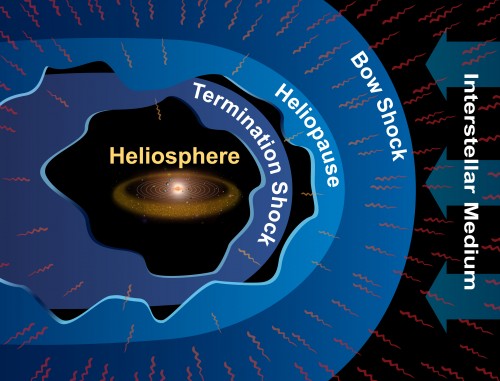
The various regions at the edge of the solar system. (Courtesy: Southwest Research Institute)
By Matin Durrani
Has the Voyager spacecraft left the solar system and entered interstellar space? I don’t know about you, but I’m getting a teensy weensy bit bored by this question, which has been going on for years now.
Last September, we blogged about a paper in Science that, yep, it had definitely left the solar system a year before – on 25 August 2012 in fact.
Previous to that, though, there had been other reports that no it hadn’t (June 2013), it really, definitely is getting near the edge, but hang on actually not yet (March 2013), we’re not quite sure (June 2011), of course it’s definitely heading for interstellar space (November 2009), it’s already right near the edge (or possibly not) (November 2003).
Anyway, now two Voyager team scientists – George Gloeckler and Len Fisk from the University of Michigan at Ann Arbor – have had a paper accepted for publication in Geophysical Research Letters, in which (according to a press release from the American Geophysical Union, which publishes the journal) “they have developed a test that they say could prove once and for all if Voyager 1 has crossed the boundary”.
Apparently these guys think the craft is still in the heliosphere. In fact, they predict that in the next two years, Voyager 1 will cross the “sprawling surface within the heliosphere where the polarity of the Sun’s magnetic field changes from plus to minus”, at which point the craft will detect a reversal in the field – proving it is still within the heliosphere.
But if the field reversal doesn’t happen in the next year or two as expected, then – drumroll – the craft has most definitely already passed into intersteller space.
So there you have it: the Michigan researchers think Voyager 1 is still in the solar system, that it will remain there for the next two years, but they’ve devised a test that might prove them wrong.
Or right.
Personally, I can see this question dragging on for a while yet.
Trackback: Physics Viewpoint | Yeah but no but yeah but no but…